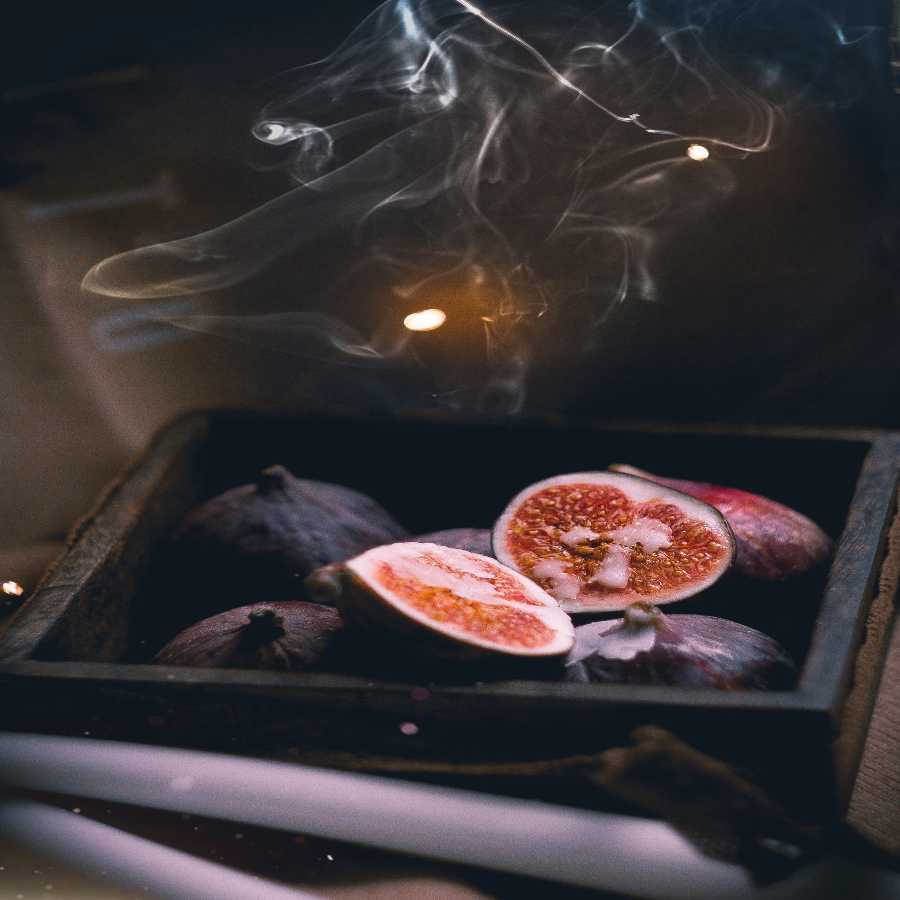For breakfast, Zip and I will eat a rancid jar of olives, a brittle feather from the windowsill, and a single dehydrated fig. Good pickings, rich pickings, delicacies. We will start light, first the olives, then the feather, and finally the fig which has been confined to this apartment for as long as we have. This meal is celebration.
We move with humid routine: Zip rattles the soup tins we use as teacups from the highest cupboard and I dust off the man’s atlas to use as a coffee table. Zip nearly overfills our teacups with rainwater. I plate our feast with my steadiest hands in a decade.
Zip and I were told we are sisters, or cousins, or maybe even neighbours. There is no point in remembering life before the man, before this apartment, before Zip. We fit each other like keys which is why I love her. Her pinkie the perfect size for my belly button, my littlest toe the exact gauge of her nostril, her canine teeth slottable between my molars. I know the places her body receives mine seamlessly, the exact concaves of her skin that fit my skin. I know her laugh and how to mimic it and know she trembles when nervous and that her fear smells like oranges. This morning, Zip is jittering citrus.
“Stick your tongue out,” I say as her bones fritz like the strings of a piano under pressure. Dawn highlights a streak of blood on her forearm, still damp when I stroke it. She stares dully at our feast and rests her chin on her knees. “Zip, stick your tongue out.”
“Shouldn’t we wash him?” She nibbles on her fingernails that have already been stripped clean. Her knees twitch, and she struggles not to look at what is now the forbidden place, our only rule, to keep our eyes off the television nook.
“Stick your tongue out.”
When she does, I place an olive in her mouth, and then one into mine, and before we swallow, we kiss good luck on the lips, like we always do. One by one, the olives melt on our tongues, sour with vinegar, and one by one, we kiss good luck, our upper lips salted with sweat and brine.
“He should have a burial,” she says. Her face is guarded in shadow, positioned toward the forbidden place again. Her knees begin to totter.
Zip is unwell. It seems she has been unwell for a decade. She is the colour of oatmeal, her skin ripe with acne from poor washing up. Her eyes are swollen, lilac around the edges. I reach her face with a tatter of my skirt and wipe a lattice of blood from her jaw. She is cadaverous, her limbs knotty and scratched with bruises. No amount of wiping will take them away. But we have agreed to get healthy, to eat our good pickings/rich pickings/delicacies like we always do, even now that things are different. We have agreed it’s better to keep routine. So, we eat together between kisses until the jar of olives is empty. And when her knees still tremble, I lift the feather from our table and comb it along the back of her hands. Gooseflesh sprouts on her arm, and I don’t stop until her knees still.
“Good protein,” I say, and twist the feather in my hands until it breaks in two. I pass her half and peck her mouth before slurping my serving.
“He should go back to the earth,” she says, feather spooling from her lips as she chews.
I lift our fig from the table and rip it in two. One piece comes out larger than the other, and I hand her one with my eyes closed so I don’t have to accept guilt for giving her the smaller half.
She doesn’t look at it. It sits, sticky, warming in her palm, sinewy at the tear.
“Eat your fig,” I say.
“Everyone deserves a burial.”
She doesn’t jump when I swat her palm, but the fig does. It nearly rolls off her hand and onto the floor but not before I catch it. Zip is unwell as the fig melds onto my skin, Zip is unwell as I pull my half up to hers and compare their tears, Zip is unwell as I fit them back together.
“This is a celebration,” I say, lifting the fig to her eyes. I feel inclined to bite her. Even when I shift an inch from her nose, she looks at the ground, her eyes trailing to the forbidden place; she is the negative charge, it is the positive. “Today is a good day.” And it is—today, I no longer share her. She is mine and I am hers and we are one and unsplittable.
But something in my voice unsettles her because she nearly cries. Zip balloons like a blackberry when she’s close to crying, her eyes plummy with irritation. She is my sister, my best friend, my roommate, my cousin, my own, unshared thing. My celebration. We know nothing more than each other, than this apartment, than the man who can no longer keep us forever. The broken-unbroken fig swells with my sweat like her eyes do, gummy and germy and things we are used to being. It is only instinct to take her hand within my own, our fingers becoming one finger, our skin the same skin, roll the fig in our palm, and catapult it at the forbidden place.
We do not hear it land and will not check. Our hands sticky and figless. Our knees a single, jittering knee. Our mouths one mouth. We are bound forever.

